At most of the countryâs most sensible sports activities schools, vetting athletes for previous sexual misconduct and violent acts below a brand new NCAA coverage boils down to at least one step: asking them.
The coverage used to be the nationwide faculty sports activities groupâs solution to a sequence of scandals during which coaches recruited athletes with histories of violence towards girls, a few of whom have been later accused of reoffending. Beginning with the 2022-23 college 12 months, the guideline used to be supposed to stay campuses more secure.
But when an athlete solutions ânoâ to an inventory of questions on prison convictions and college disciplinary motion, officers at many multi-sport powerhouses â the College of Alabama, Louisiana State College, Ohio State College and extra â in most cases take their phrase for it.
âThey completely donât need to know,â mentioned Brenda Tracy, a gang-rape survivor whose nonprofit, Set The Expectation, works to cut back sexual violence in sports activities by way of instructing athletes and coaches. âItâs âDonât ask, donât inform.ââ
Followed 3 years in the past by way of the NCAAâs perfect governing frame, the coverage calls for all 1,100 member colleges to take âaffordable stepsâ to verify whether or not new and proceeding athletes have data of great misconduct, together with sexual attack, relationship violence and attack inflicting severe physically hurt. Athletes should every year expose any prison convictions and college disciplinary movements, and colleges should have written procedures for acquiring data from athletesâ earlier colleges.
The NCAA Board of Governors, then again, left the main points to every college. It declined to centralize the method, factor uniform requirements or outline âaffordable steps.â The result’s a patchwork of protocols filled with loopholes and gaps.
A USA TODAY research of vetting practices at 51 colleges that compete within the NCAAâs âEnergy 5â meetings â the highest echelon of school sports activities â discovered greater than part depend at the honor gadget as an alternative of checking data. Whilst two dozen colleges, together with Michigan State College and the College of Texas at Austin, require every athleteâs earlier establishments to signal a kind testifying to their self-discipline historical past, 27 different colleges check it provided that the athlete solutions a query âsure.â
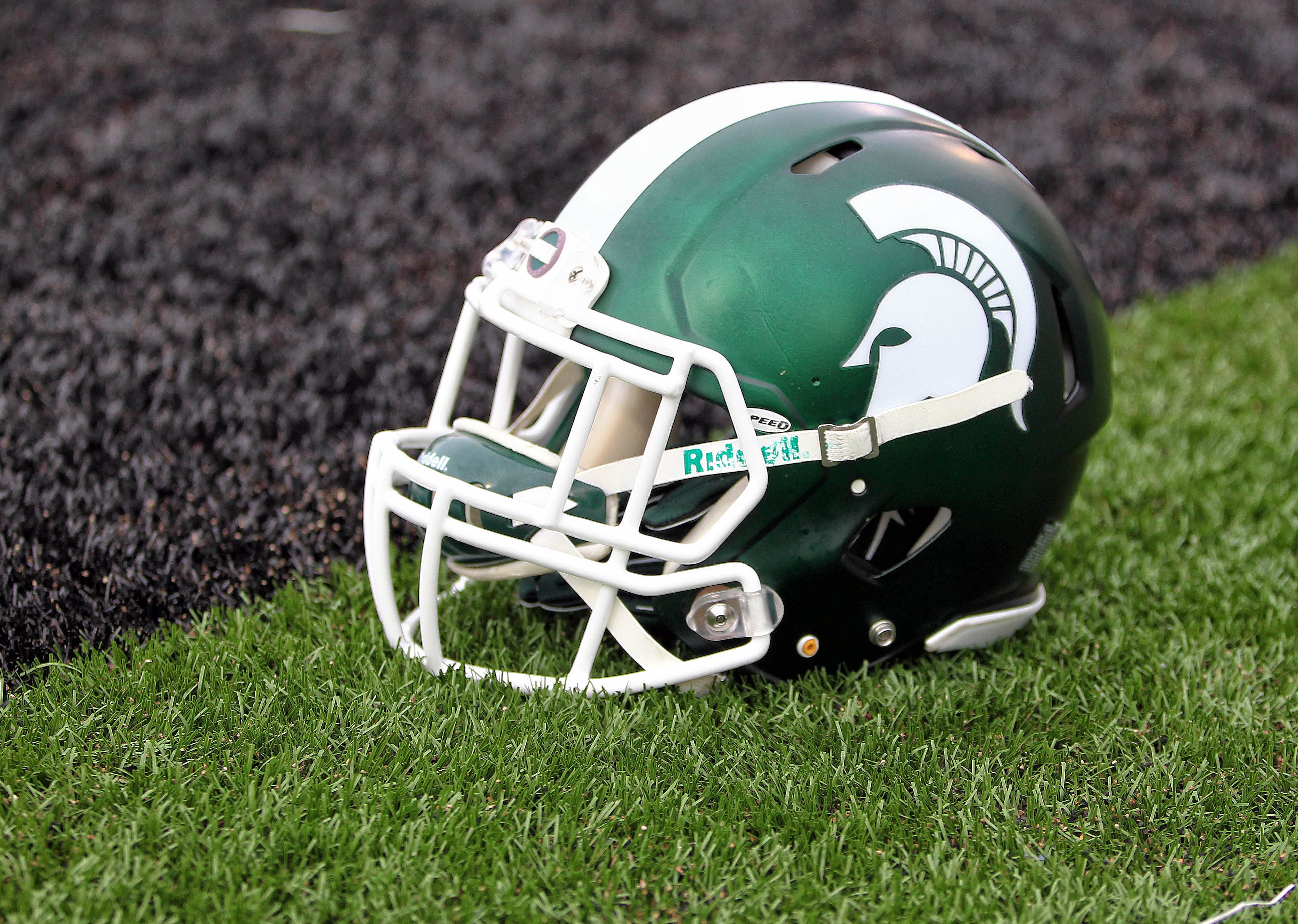
Michigan State College and College of Texas at Austin are two colleges that require every athleteâs earlier establishments to signal a kind testifying to their self-discipline historical past.
Michigan State College and College of Texas at Austin are two colleges that require every athleteâs earlier establishments to signal a kind testifying to their self-discipline historical past.
MIKE CARTER and JOHN GUTIERREZ, USA TODAY SPORTS
College officers say self-disclosure bureaucracy arenât the one measure they take to vet recruits. For example, coaches and make stronger body of workers get to grasp them thru telephone calls and texts, reviewing their social media accounts and chatting with their oldsters, coaches and teammates, mentioned Ben Johnson, an Ohio State spokesperson.
âThe Ohio State College Division of Athletics is assured in its protocols to be told if incoming, shifting student-athletes have had prior or pending disciplinary movements or prison court cases,â Johnson mentioned.
Monica Watts, an Alabama spokesperson, mentioned the disclosure shape is âonly one facet of a radical and multi-faceted overview procedureâ that incorporates conversations with someone â from docs to counselors and alumni â who can give details about a potential athleteâs personality, behavior and problems of outrage.
LSU is operating on making a separate behavior disclosure shape that it is going to ship to potential switch athletesâ former establishments, athletics spokesperson Cody Worsham mentioned.
The pitfalls of relying on athletes and their supporters to document data that might injury their reputations and careers have been on complete show in Might, when information emerged that two soccer gamers on the College of Arizona and the College of Wisconsin-Madison had settled a lawsuit filed towards them by way of a tender girl.
The lady mentioned the gamers, Jayden de Laura and Kamoâi Latu, raped her in a Hawaii parking storage in October 2018 after main their highschool staff to victory within the state championship. The lady used to be a minor on the time. The lawsuit mentioned each athletes had pleaded accountable to sexual attack in the second one level; de Lauraâs lawyers mentioned later that the case used to be adjudicated in circle of relatives court docket.
By the point the girl filed swimsuit in Hawaii civil court docket, de Laura used to be the quarterback at Washington State College and Latu used to be a security on the College of Utah. Each gamers introduced quickly after that they might switch colleges. De Laura in January 2022 mentioned he would sign up for Arizona. Latu dedicated to Wisconsin in Might.
Jayden de Laura and Kamoâi Latu transferred to the College of Arizona and the College of Wisconsin-Madison, respectively, after being sued by way of a lady who mentioned they raped her in highschool. They didn’t expose the subject to their new coaches.
Jayden de Laura and Kamoâi Latu transferred to the College of Arizona and the College of Wisconsin-Madison, respectively, after being sued by way of a lady who mentioned they raped her in highschool. They didn’t expose the subject to their new coaches.
DARREN YAMASHITA and MIKE DE SISTI, USA TODAY Community
But the athletes it sounds as if didn’t expose the subject to their new coaches. In public statements issued after the inside track broke, each colleges mentioned they discovered of the lawsuit â and the rape allegations â after soccer season began the next fall. Arizonaâs and Wisconsinâs self-disclosure bureaucracy, which USA TODAY reviewed, ask about prison convictions and college self-discipline however no longer complaints or juvenile delinquency court cases.
Latuâs lawyer, Michael Inexperienced, mentioned in an e mail that his shopper âdoes no longer intend to touch upon a case that has been closed for years.â Wisconsin spokesperson John Lucas famous that Latu, in his solution to the lawsuit, denied the girlâs declare that he pleaded accountable to sexual attack in the second one level. As a result of juvenile court docket data are sealed, the college may no longer independently check, Lucas mentioned.
âWe don’t have any definitive data indicating that there used to be a rate or conviction,â Lucas mentioned.
Arizona didn’t make de Laura to be had for an interview and emails to his lawyer went unreturned. In a observation to USA TODAY, Arizona athletics spokesman Matt Ensor mentioned officers discovered of the subject in September 2022 and made up our minds it didn’t fall throughout the scope of its insurance policies, so de Laura didn’t wish to expose it.
âThe College straight away started a overview of the subject and concluded that there is not any indication that de Laura used to be ever criminally convicted or topic to self-discipline thru a Name IX continuing of sexual, interpersonal, or different acts of violence, stemming from the incident referenced within the civil grievance,â Ensor mentioned within the observation.
Most facultiesâ bureaucracy don’t ask questions that might be offering a fuller image of an athleteâs behavior background. USA TODAY reviewed clean variations of the behavior disclosure questionnaires utilized by 44 colleges. Fewer than part requested about pending prison circumstances. Handiest seven requested about juvenile delinquency circumstances. Six requested about arrests, and 4 requested about civil complaints.
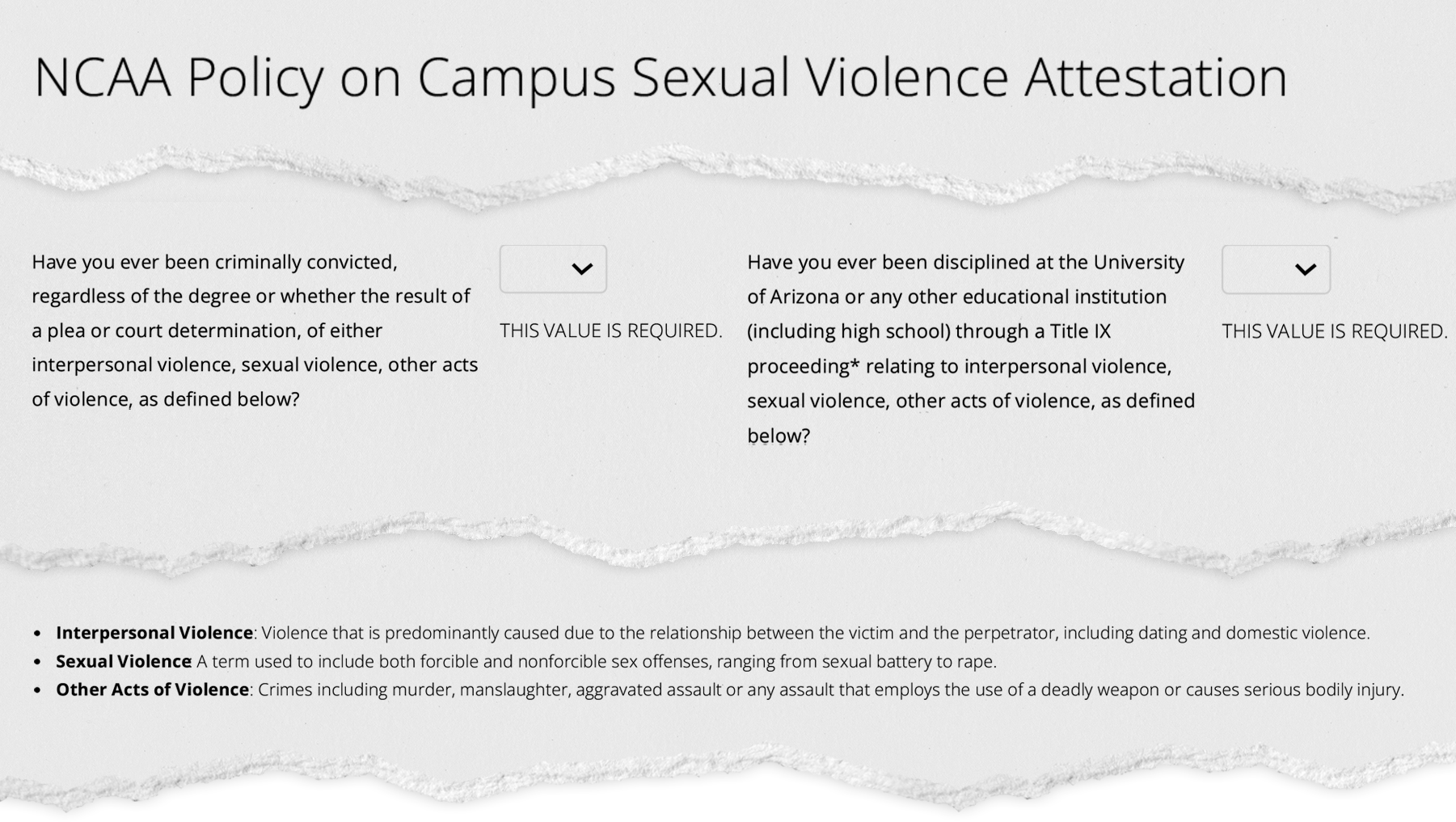
College of Arizona; USA TODAY photograph representation
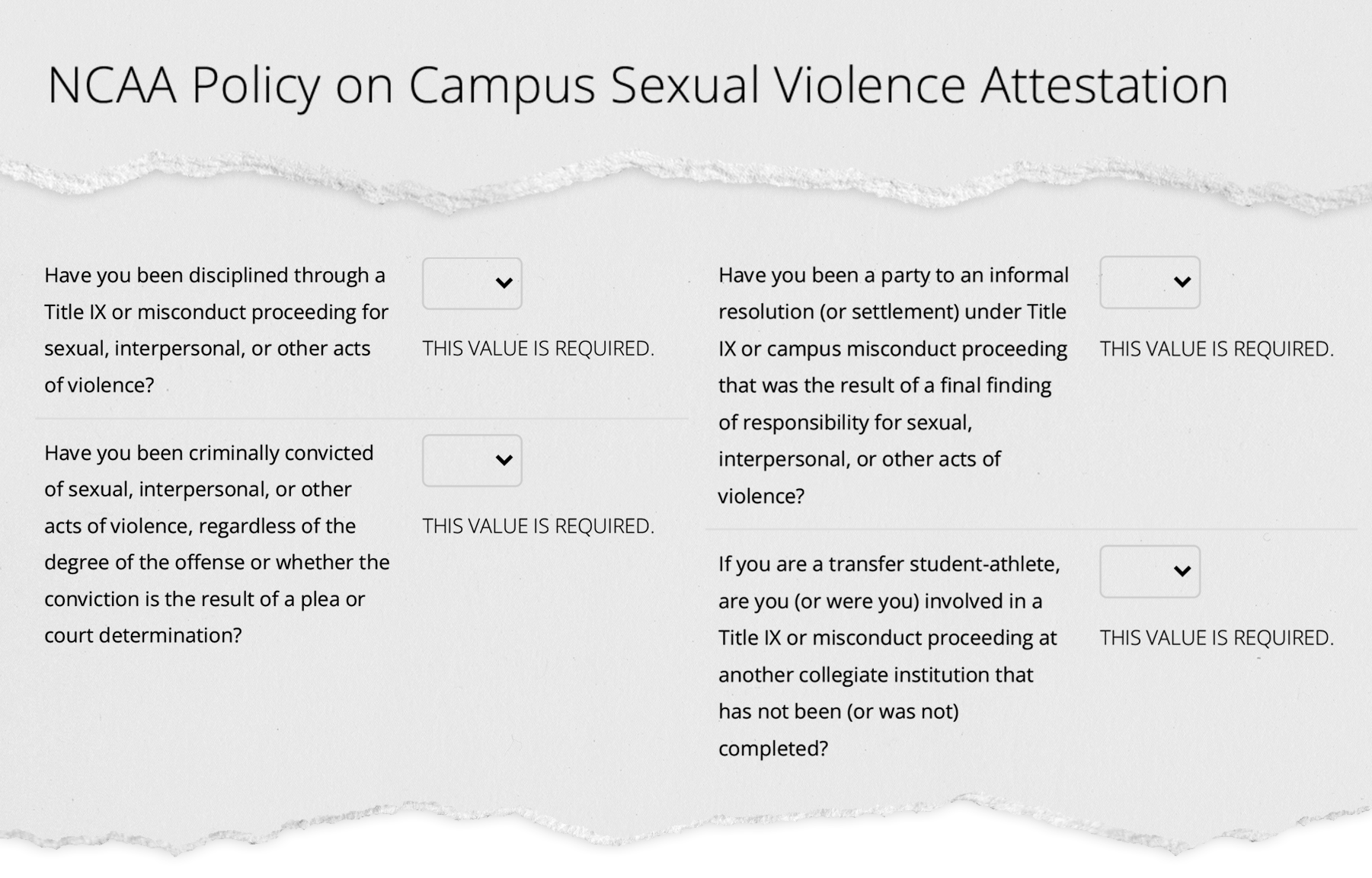
College of Wisconsin-Madison; USA TODAY photograph representation
The NCAA is meant to penalize colleges for failing to conform to the foundations by way of banning them from internet hosting championship competitions for a 12 months. But it surely, too, is dependent upon the glory gadget: It calls for college directors to every year attest if they agree to the coverage, and it trusts them if they are saying they’re.
The NCAA declined to touch upon USA TODAYâs findings, as an alternative issuing a written observation.
âIt’s extremely vital and, certainly, the duty of every establishment to conform to all coverage elements and to increase any essential processes to verify they effectively put into effect the coverage and will attest to their compliance,â NCAA communications director Michelle Brutlag Hosick mentioned within the observation.
The penalty for breaking regulations isn’t important sufficient to prevent colleges from violating it anyway, mentioned Daisy Tackett, a former rower on the College of Kansas who sued her college in 2016 after she mentioned a soccer participant raped her in a campus dorm.
LESLIE BOORHEM-STEPHENSON, USA TODAY NETWORK
On the finish of Kansasâ investigation of the case, Tackett won a letter from the college pronouncing it had âsuccessfully expelledâ the participant, who transferred quickly after to Indiana State College. When an area newspaper introduced her case to Indiana State officersâ consideration, they disregarded the participant â and claimed to had been ignorant of it.
âI simply donât know how that is nonetheless an issue,â Tackett mentioned. âItâs is an answer that claims, âWe donât in truth care about this.ââ

The NCAA is infamous for relentlessly imposing its greater than 400-page rulebook that regulates many facets of athletesâ lives, from grades to source of revenue, drug use to foods.
NCAA regulations enforcers have weighed in on controversies reminiscent of whether or not gamers had to reimburse their college for consuming an excessive amount of pasta at a ceremonial dinner, whether or not a trainer may promote an athlete a used bed and whether or not a bagel must depend as one of the vital 3 foods a faculty may supply an athlete on a daily basis. It dominated that bagels by way of themselves have been permissible to function snacks, however bagels with cream cheese constituted a complete meal.
With regards to regulating sexual misconduct and violence, then again, the NCAA takes a hands-off way.
The NCAAâs rulebook outlines no explicit consequences for athletes who have interaction in severe misconduct. Avid gamers ceaselessly exploit its one significant penalty for many who switch whilst suspended or after being expelled â a 12 months of bench time â by way of enrolling at a junior faculty for a semester or shifting earlier than the self-discipline takes impact.
Till remaining 12 months, no NCAA-wide regulations for screening athletes existed both. A handful of meetings and particular person colleges had followed their very own insurance policies after high-profile incidents.
In 2015, Alabama head trainer Nick Saban recruited Jonathan Taylor, a defensive lineman who were disregarded by way of the College of Georgia lower than a 12 months previous after his arrest for allegedly choking his female friend in a dorm room. Saban to start with known as Taylor âthe type of man that deserved a 2nd probability.â
Taylor used to be arrested once more in a home violence case with a brand new female friend 3 months later. Saban disregarded him.
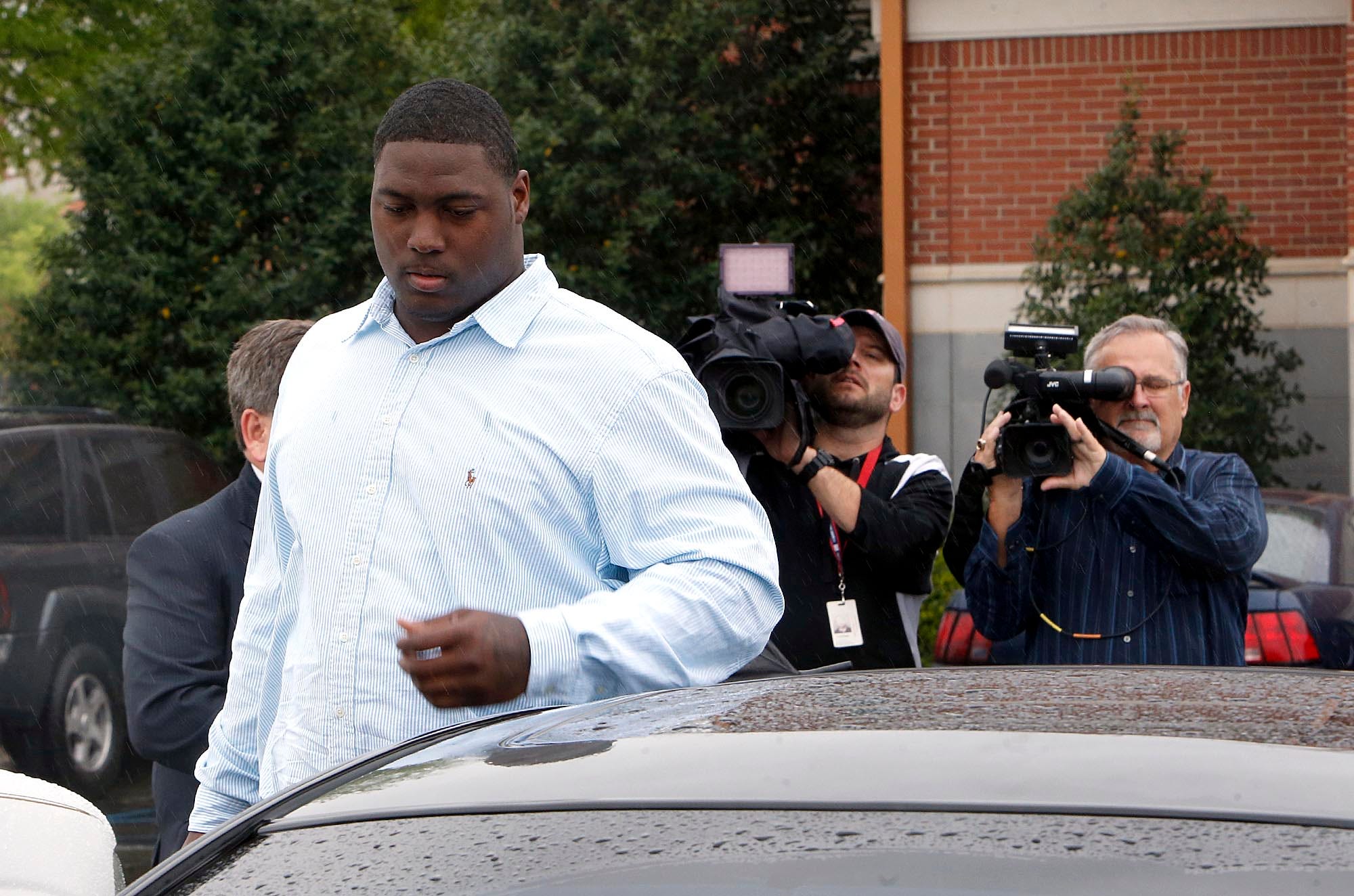
The second one arrest of defensive lineman Jonathan Taylor, who used to be recruited to Alabama by way of head soccer trainer Nick Saban regardless of allegations of violence towards girls, brought on the Southeastern Convention to undertake a first-of-its-kind severe misconduct coverage.
The second one arrest of defensive lineman Jonathan Taylor, who used to be recruited to Alabama by way of head soccer trainer Nick Saban regardless of allegations of violence towards girls, brought on the Southeastern Convention to undertake a first-of-its-kind severe misconduct coverage.
ROBERT SUTTON, TUSCALOOSA NEWS; MARVIN GENTRY, USA TODAY SPORTS
Public outrage in regards to the case brought on the Southeastern Convention to undertake a first-of-its-kind severe misconduct coverage requiring colleges to behavior due diligence on recruits. It additionally barred its colleges from accepting switch athletes who’ve been criminally convicted or disciplined by way of a prior college for a spread of great offenses.
The Large 12 Convention, the %-12 Convention and a couple of others adopted, adopting severe misconduct insurance policies over the following few years. However athletes with data of sexual misconduct endured to slide throughout the cracks.
A USA TODAY investigation in December 2019 known a minimum of 33 athletes who had transferred to NCAA colleges after being disciplined by way of a prior college or criminally convicted for a sexual offense. They integrated a San Diego State punter discovered liable for raping a feminine pupil on the College of Kentucky and a Texas Tech College sprinter who helped the Purple Raiders win the monitor and box nationwide championship a 12 months after Illinois State College disciplined him for sexual harassment.
When approached by way of journalists, most of the coaches who recruited the ones athletes instructed USA TODAY they weren’t acutely aware of their athletesâ previous offenses.
The Board of Governors introduced the brand new association-wide vetting necessities 4 months later, in April 2020. They have been intended to take impact for the 2021-22 college 12 months, however the board behind schedule them a 12 months as a result of the coronavirus pandemic.
The coverage outlines the baseline steps that colleges should take to conform. Nowadays, many donât promise a lot more than that.
From the universitiesâ viewpoint, âWhy do extra?â requested Kristy McCray, an Otterbein College professor who researches sexual violence prevention in sports activities.
âIf the NCAA sought after everyone to take all of the ones steps, they might have written an overly transparent coverage telling everybody to take the ones steps. They didnât,â McCray mentioned. âNot anything within the NCAA steering tells you it’s important to do greater than the naked minimal.â

When the NCAA board followed the brand new regulations, it equipped no type for colleges to observe.
The board directed every college to undertake its personal vetting procedures and create its personal disclosure bureaucracy. It additionally declined to check any collegeâs coverage to verify it used to be as much as par. Consequently, the thoroughness with which athletes are backgrounded these days is dependent closely on which college is recruiting them.
Iowa State Collegeâs vetting procedure âmightâ come with soliciting for recordsdata from earlier establishments and police departments and interviewing other people, however provided that the athlete discloses an incident first.
Arizona State Collegeâs coverage says officers will âtake affordable stepsâ to verify athletesâ self-discipline historical past with out specifying what the stairs are. Christopher Fiscus, a faculty spokesperson, mentioned officers touch athletesâ pals, members of the family and previous coaches or directors and ship verification bureaucracy to switch athletesâ earlier colleges, regardless that those steps don’t seem to be written down.
On the College of Colorado, affordable steps should come with handiest one of the vital following: talking with an athleteâs oldsters, trainer or steering counselor; paying for a third-party background test; or doing a âcursoryâ seek on the web or social media.
The College of Michigan, the College of Missouri and Iowa State audit a pattern of self-disclosure bureaucracy during which athletes responded ânoâ to each query, verifying the guidelines with their former colleges. Missouri spokesperson Ryan Koslen mentioned the college additionally conducts background assessments on all switch athletes however didn’t say what that involves.
Michigan spokesperson Rick Fitzgerald mentioned officers are assured that their way complies with NCAA regulations, they usually âacknowledge that different establishments could have other procedures.â
âWith regards to admissions and plenty of different issues, itâs vital to notice that pupil athletes undergo the similar procedure used for all different scholars,â Fitzgerald mentioned in an emailed observation. âPupil athletes are also topic to all different insurance policies and procedures that follow to scholars in most cases.â
Iowa Stateâs way permits it to seize essentially the most severe offenders, mentioned senior affiliate athletic director Shamaree Brown, who mentioned the college does extra due diligence than a few of its friends.
âWeâre in a position to get an attractive excellent image of our student-athletes that weâre recruiting,â Brown mentioned. âIs there an opportunity that one thing may slip throughout the cracks? Yeah.â
The NCAA necessities don’t seem to be the one safeguard. Many faculties ask questions on prison historical past or prior college self-discipline on their admissions programs. Moreover, when athletes switch, the college they depart should point out within the on-line NCAA switch portal whether or not the athlete is below disciplinary suspension.
However in the case of switch scholars, federal legislation lets in â and NCAA coverage calls for â colleges to percentage extra whole self-discipline details about athletes with every different. So advocates query why extra colleges donât request it.
The NCAA must take an lively position within the vetting procedure, mentioned Cody McDavis, an lawyer and previous faculty basketball participant who advocates towards sexual violence in recreation. He and Tracy driven the NCAA board to undertake uniform regulations once they sat on its Fee to Fight Sexual Violence from 2016 thru 2018.
That athletic departments put the onus on athletes to self-disclose misconduct as an alternative of verifying it themselves, McDavis mentioned, displays they’re extra concerned about âchecking a fieldâ than studying the reality about whom they’re inviting to their campuses.
âItâs a sport of culpability,â he mentioned. âThey get to mention, âWe have been lied to. We did our process. We requested the questions. The coed-athlete lied to us, and so we donât have culpability â the athlete does.ââ
A number of Energy 5 colleges seem to be out of compliance with the NCAAâs minimal necessities, USA TODAYâs research discovered.
4 colleges mentioned they have got no written vetting procedures, although they have been intended to be following such procedures all 12 months. The College of California, Berkeley, the College of Mississippi and the College of North Carolina at Chapel Hill all mentioned their procedures weren’t whole. The College of Southern California mentioned it follows a procedure that isnât written down.
Wisconsin has a written coverage, but it surely says not anything about steps officers will take to vet incoming recruits. The coverage, enacted in 2019 â a 12 months earlier than the brand new necessities have been followed â outlines handiest how the college will reply if a present athlete is charged with against the law, arrested or disciplined for a pupil behavior violation.
Nonetheless, Wisconsin plans to attest that it complied with the NCAA coverage come the November cut-off date, senior affiliate athletic director Katie Smith instructed USA TODAY.
Smith declined to mention whether or not the varsity would alter its protocols or ask extra all-encompassing disclosure questions in gentle of the placement with Latu, one of the vital gamers sued for sexual attack in Hawaii. Wisconsin’s athletic division is ârepeatedly comparingâ its practices, Smith mentioned. She mentioned it might assist, then again, if the NCAA would step in.
For example, Smith mentioned the NCAA may supply colleges a uniform checklist of questions to invite. Or it would facilitate the disclosure and verification processes throughout the NCAAâs Eligibility Middle, which might make it more straightforward for colleges to percentage data.
âFor a subject of such nice significance and magnitude,â she mentioned, âI feel it might be useful to have a standardized way right through the rustic.â

Tracy and different advocates had been pushing NCAA leaders to undertake a uniform severe misconduct coverage for years.
In 2018, bored with looking forward to the NCAA to behave, Tracy advanced her personal coverage with the assistance of prison professionals. Dubbed the âTracy Rule,â it builds at the Southeastern Convention and Large Sky Convention insurance policies however is extra exhaustive and ironclad. She has instructed college leaders who’ve employed her for prevention schooling coaching to undertake it.
Tracy concept loads of colleges would touch her in regards to the rule after the brand new NCAA necessities got here out. Up to now, she mentioned, handiest two â the College of Texas at San Antonio and the College of Virginiaâs Faculty at Smart â have followed it. Neither competes within the Energy 5.

THOMAS BENDER, HERALD-TRIBUNE
The vetting procedures Energy 5 colleges followed as an alternative âreally feel like a right away mirrored image of ways every establishment actually feels about those problems,â Tracy mentioned.
âTo peer simply the minimal quantity of effort that has been put into those â nearly like no concept in any respect â is in point of fact irritating,â she mentioned.
The Tracy Rule is going way past the minimal NCAA necessities.
Underneath the guideline, athletes should every year whole an in depth questionnaire about convictions, college disciplinary motion, juvenile court cases, complaints and some other legislation enforcement investigations during which they have been a suspect. The questionnaire covers quite a lot of offenses, from sexual exploitation to hate crimes and manslaughter.
For switch athletes, the guideline calls for the Name IX coordinator at every in their earlier colleges to signal a kind testifying as to whether the athlete used to be a respondent in a case treated by way of their place of work and whether or not the athlete used to be discovered at fault.
Via default, athletes who’ve been convicted of a legal or misdemeanor, discovered antisocial in a juvenile continuing, or disciplined by way of a faculty or athletic division for severe misconduct are disqualified from competing below the guideline, regardless that they may be able to request a waiver.
If a overview panel consisting of the Name IX coordinator and different campus officers determines the athlete must obtain a waiver, the panel main points its rationale in a report back to the president and athletic director, who can approve or deny it. If the panel comes to a decision a waiver is unwarranted, its choice is ultimate.
Within the 4 years since Texas at San Antonio followed the guideline, a handful of athletes have disclosed severe misconduct, the varsityâs athletic director Lisa Campos mentioned. The overview panel met simply as soon as to check an athleteâs waiver request, Campos mentioned, and it did so out of an abundance of warning. The panel granted the waiver.
The guideline has acted as a deterrent of varieties, Campos mentioned. When athletes refuse to finish the questionnaire or go through the vetting procedure, coaches forestall recruiting them.
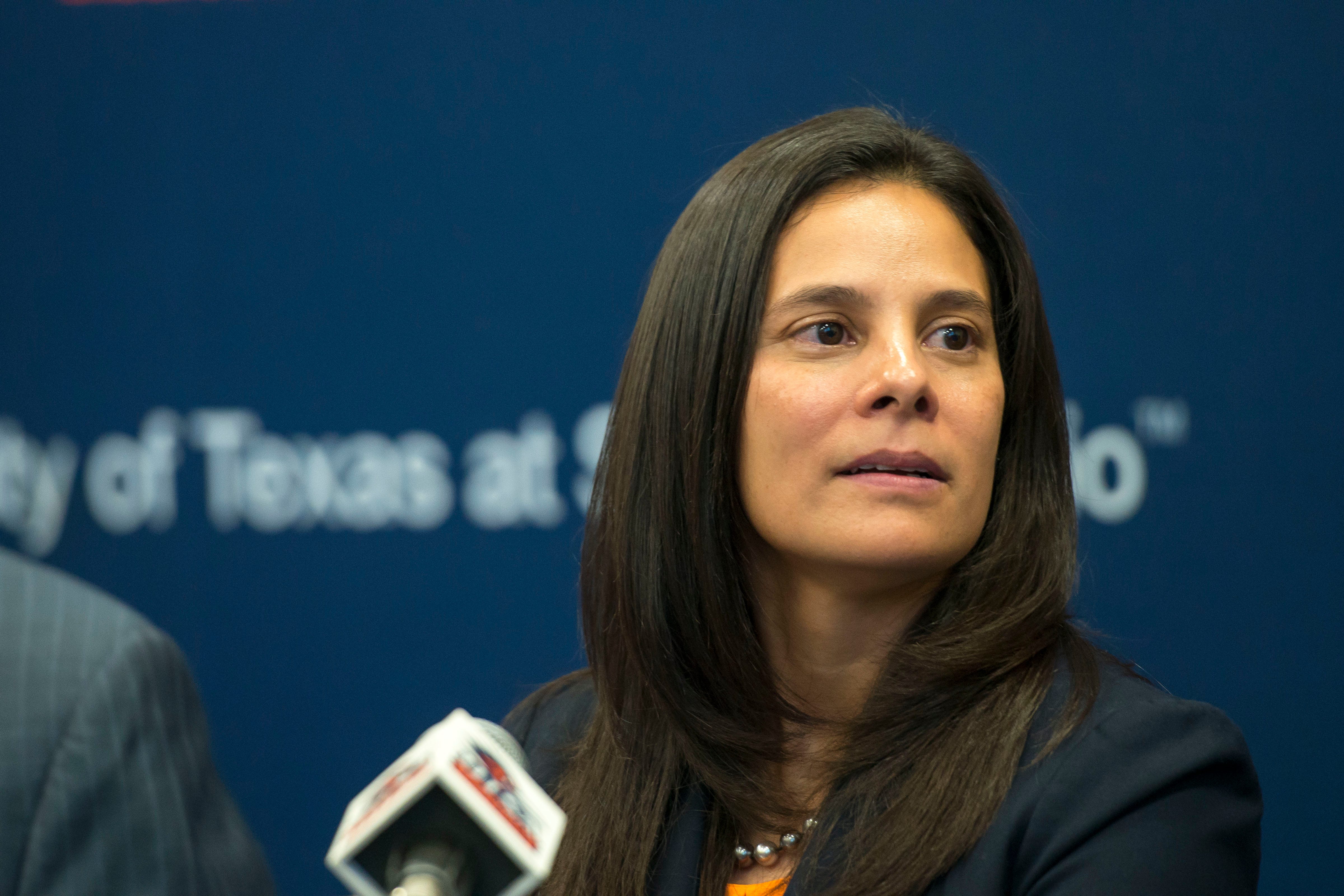
Courtesy/College of Texas at San Antonio
âIt kind of feels to be operating the best way we supposed it to,â Campos mentioned.
Texas at San Antonio officers have no longer stuck an athlete mendacity at the questionnaire, Campos mentioned. Even supposing the vetting procedure can also be time-consuming, specifically in an generation when transfers occur at lightning pace throughout the NCAAâs on-line switch portal, she mentioned taking the additional step of verifying athletesâ responses is the most important.
âWe are hoping that weâre recruiting pupil athletes that we will agree with,â Campos mentioned, âhowever for them to additionally know that we’re going to check from some other college your background, I feel that displays the seriousness of what we’re seeking to do.â
For Virginiaâs Faculty at Smart, the 2022-23 college 12 months â its first 12 months with the guideline in impact â went reasonably seamlessly, athletic director Kendall Rainey mentioned. Coaches embraced the guideline, she mentioned, and athletes and their oldsters thanked the college for doing its due diligence.
âItâs a in point of fact treasured a part of our insurance policies right here, our tradition right here, and our manner of assembly the brand new NCAA necessities, but it surelyâs extra than simply the coverage,â Rainey mentioned. âItâs in regards to the interactions, and the human facet of the entire thing and the entire revel in.â
Two athletes disclosed behavior at the questionnaire, Rainey mentioned. In a single case, she mentioned, officers made up our minds it didn’t have compatibility the definition for severe misconduct. The opposite athlete signed with some other college earlier than the overview panel convened.
Two athletes declined to finish the questionnaire, Rainey mentioned, so the college didn’t recruit them.
Rainey beneficial the Tracy Rule to different colleges, encouraging them to not really feel crushed on the prospect. Different NCAA regulations round social media use are tougher to put in force, she mentioned.
Template procedures and questionnaire bureaucracy equipped by way of Tracyâs nonprofit made the method easy, mentioned Tabitha Smith, the collegeâs Name IX coordinator.
âI feel it’s important to glance inward into your center and your values of your establishment,â Smith mentioned. âIt kind of feels like a no brainer.â
Kenny Jacoby is an investigative reporter for USA TODAY protecting Name IX and campus sexual misconduct. Touch him at [email protected] and observe him on Twitter @kennyjacoby. Savannah Kuchar is a USA TODAY Washington Watchdog Fellow. She can also be reached at [email protected] or @savannahkuchar

Name IX: Falling brief at 50: Regardless of super positive aspects throughout the previous 5 a long time, many faculties and universities fall wanting Name IX, leaving girls suffering for fairness.